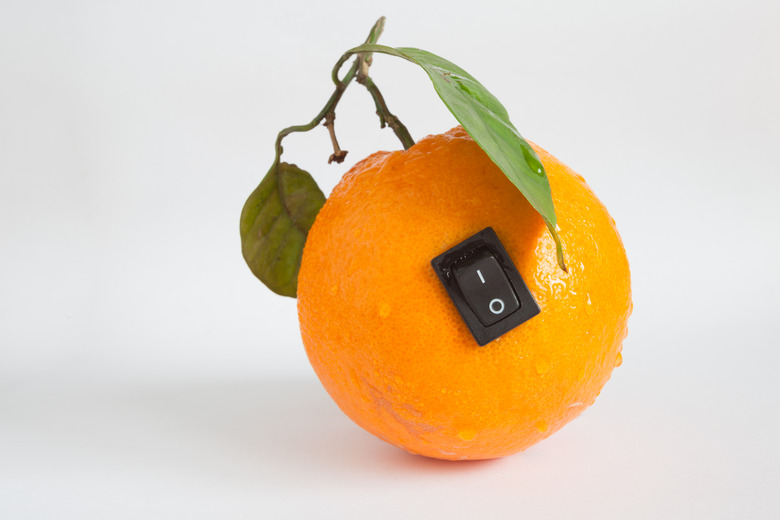Why Do Citrus Fruits Produce Electricity?
If you suffer a power outage that leaves you in the dark, and your flashlight is out of batteries, you might find the energy to power the bulb in your refrigerator. An orange, lemon or lime can act as a battery, and while a single one might not generate enough voltage to illuminate an LED bulb, several wired in series will. Citrus fruits can do this because they contain citric acid, an electrolyte that allows electricity to flow. The power actually comes from the electron exchange between a pair of electrodes that you insert in the fruit pulp. For the exchange to be powerful enough to do anything useful, you need a strong conducting medium, and citrus fruits – especially lemons – have that in spades.
TL;DR (Too Long; Didn't Read)
The citric acid in citrus fruits is an electrolyte that allows electricity to flow between electrodes made from dissimilar metals.
What's an Electrolyte?
What's an Electrolyte?
Whether you know what they are or not, your body uses electrolytes constantly to transmit the electrical impulses that make life possible. An electrolyte is a fluid that contains free ions. They can come from dissolved salts or from acids that donate free positively charged hydrogen atoms – protons – to solution. Because the ions can move around freely, they gravitate toward a source of opposite charge and away from a source of like charge.
Making a Citrus Fruit Battery
Making a Citrus Fruit Battery
You don't need much to make a battery out of a lemon or a lime. The electrolyte is already present in the fruit, so all you have to add is a pair of electrodes and some conducting wire to connect them. The electrodes need to be made from dissimilar metals to create a potential difference between them. Zinc and copper are a good pair. In a citric acid solution such as exists inside a lemon, copper produces extra electrons. They flow through the electrolyte to the zinc, where they build up. When you connect the electrodes with a wire, the charges travel through the wire back to the copper electrode, thus completing the circuit. A galvanized nail makes a great zinc electrode. Use a piece of 12-gauge electrical wire or a penny for the copper electrode. If you opt for a penny, make sure it was minted before 1982. Later pennies are made mostly from zinc.
Lemons Are Better Than Oranges
Lemons Are Better Than Oranges
The stronger the acid in an electrolyte, the better the electrolyte will conduct electricity and the stronger your battery will be. When it comes to citrus fruit, taste is a good indicator of acid strength, because strong acids taste more sour than weak ones. Lemons and limes are more sour than oranges and thus make better batteries, and because citric acid decays into fructose and other sugars as fruit ages, young fruit fresh off the tree is better than fruit left sitting on a shelf. Besides lemons, limes and oranges, you can also make batteries out of young apples and potatoes.
Cite This Article
MLA
Deziel, Chris. "Why Do Citrus Fruits Produce Electricity?" sciencing.com, https://www.sciencing.com/do-citrus-fruits-produce-electricity-5167602/. 17 April 2018.
APA
Deziel, Chris. (2018, April 17). Why Do Citrus Fruits Produce Electricity?. sciencing.com. Retrieved from https://www.sciencing.com/do-citrus-fruits-produce-electricity-5167602/
Chicago
Deziel, Chris. Why Do Citrus Fruits Produce Electricity? last modified March 24, 2022. https://www.sciencing.com/do-citrus-fruits-produce-electricity-5167602/
